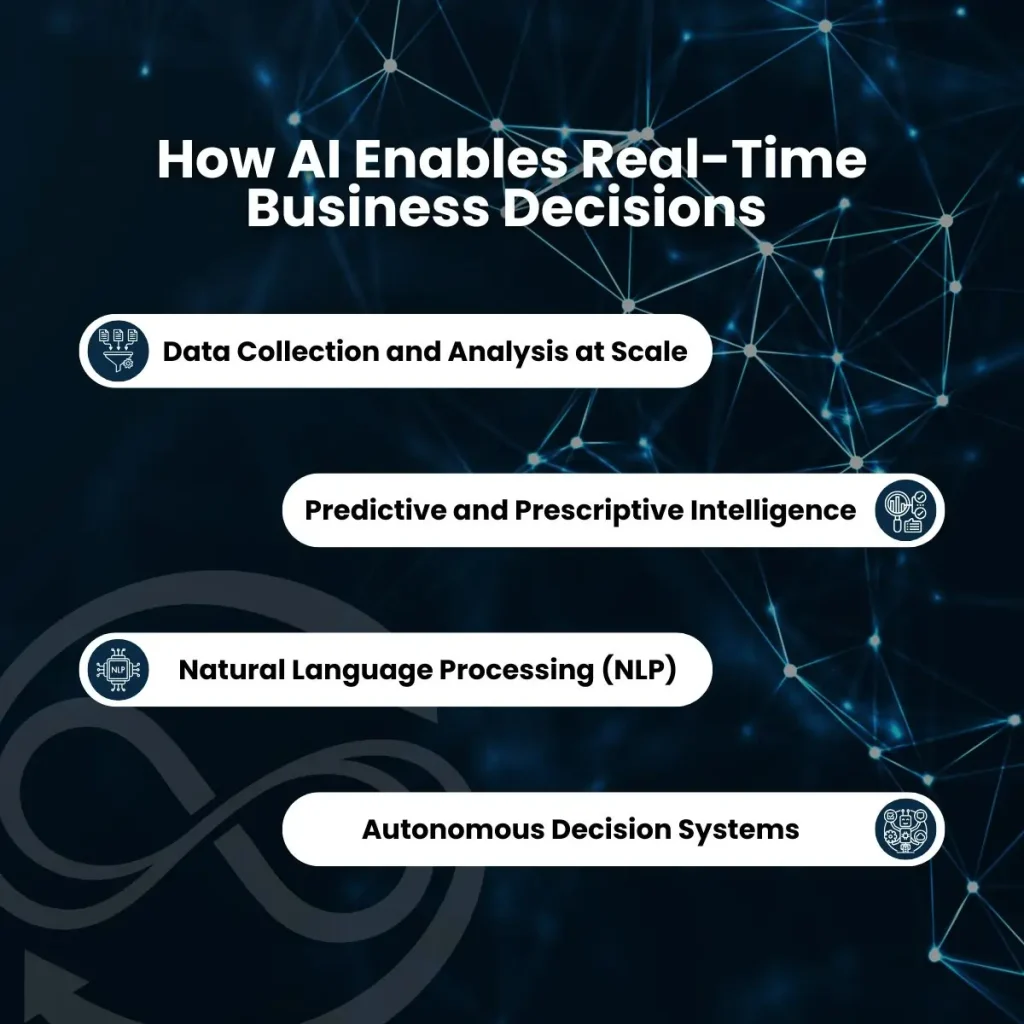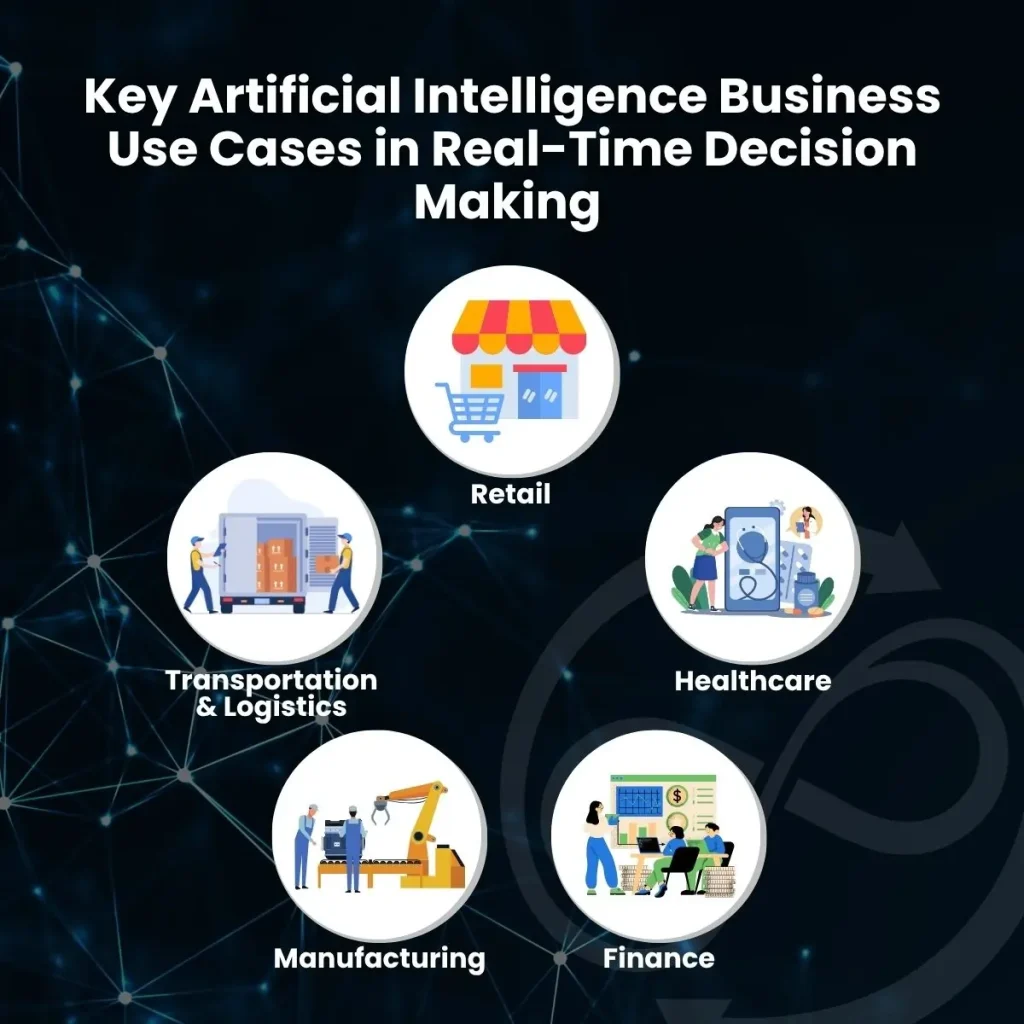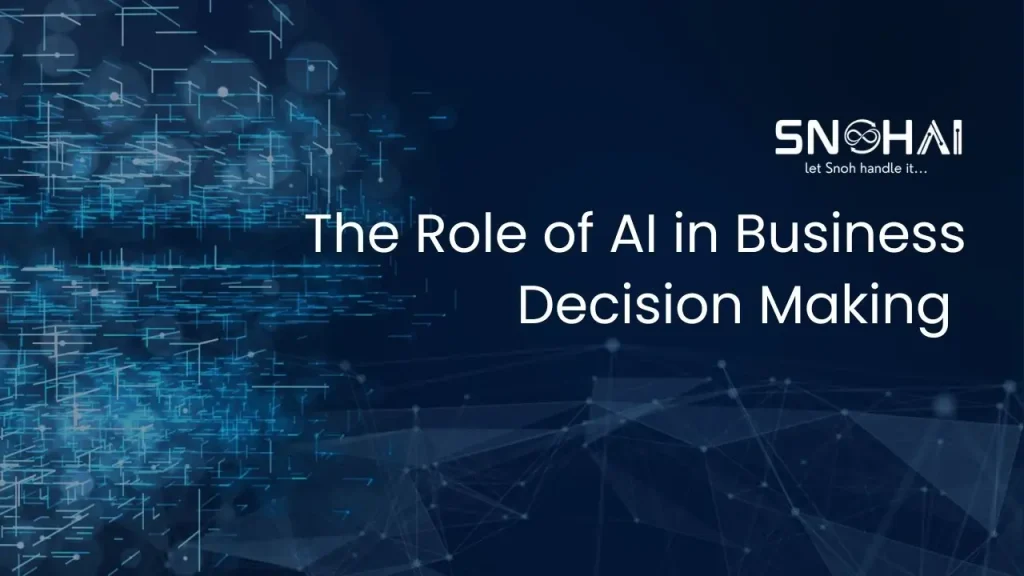With hyper-competition and data explosion all around us, AI’s role in business decision making has transformed from ‘one day’ to something essential and needed here and now. Nowadays, businesses are not utilising artificial intelligence just for back-end processes—they’re employing it for real-time, high-risk levels of business decisions, including strategy, operations, as well as customer experience management. Predictive analytics, natural language understanding, and autonomous systems provide the glue to bind AI applications to the core architecture of intelligent enterprises.
This article discusses the role of AI in business decision making on industry transformations, benefits and disadvantages posed by real-time integration of AI, and examples of practical applications of artificial intelligence in business that highlight the importance of AI in modern decision-making frameworks.
Why Real-Time Decision Making Matters in Business
Now, speed is a matter of life and death. And self-reliant businesses can take contemporaneous decisions over customer requirements and operational lags optimally instead of passively reacting. Unlike real-time analytics, prior models of data-crunching had timelines, waiting periods, slogs which led to delayed opportunities.
Enter the business strategy AI. Apart from processing data at speeds unheard of, their self-onboarded AY systems set out actionable plans while automating the scalable interpretation of analytics. Automated marketing, fraud protection, and expense caps are now blasted at gold-rush pace because every company becomes a first mover when adopting AI-driven analytics.
How AI Enables Real-Time Business Decisions

1. Data Collection and Analysis at Scale
Modern businesses generate massive volumes of data every second, from customer clicks and transactions to supply chain updates and sensor outputs. AI systems like machine learning and deep learning algorithms can sift through this data in real-time, identifying anomalies, patterns, and predictions far beyond human capabilities.
2. Predictive and Prescriptive Intelligence
AI not only tells you what’s happening (descriptive analytics) but also forecasts what will happen (predictive analytics) and suggests what you should do about it (prescriptive analytics). This makes AI-powered business decisions not just reactive but proactive, enabling businesses to make informed decisions before problems even arise.
3. Natural Language Processing (NLP)
Thanks to NLP, AI tools can analyse unstructured data such as emails, social media, customer reviews, and support tickets in real time. This unlocks hidden customer sentiments and market signals, helping businesses take quick action to improve experience or manage reputation.
4. Autonomous Decision Systems
In high-frequency industries such as stock trading, supply chain logistics, and e-commerce, AI-based systems can make automatic decisions without human intervention. For example, AI can autonomously adjust inventory levels, dynamic pricing, or route shipments—all based on live data feeds.
Using AI to Automate Business Processes for Faster Decisions
One of the most transformative trends is using AI to automate business processes, especially for repetitive and time-sensitive tasks. Robotic Process Automation (RPA) combined with AI, known as Intelligent Automation, allows companies to streamline complex workflows that involve multiple systems and datasets.
Some examples include:
- Automated credit scoring in banking based on real-time financial behaviour.
- Smart hiring tools that evaluate resumes and schedule interviews based on AI-driven match scores.
- Customer service chatbots that resolve issues instantly while learning from each interaction to improve responses.
- AI-driven CRM platforms that guide sales teams with next-best-action recommendations during live customer calls.
This automation shortens decision cycles, reduces human error, and frees up employees for more strategic work.
AI in Business Strategy: From Boardroom to Backend
AI is no longer confined to data teams; it’s becoming a boardroom priority. Companies are embedding AI into business strategy formulation, helping leaders identify growth opportunities, mitigate risks, and optimise resources. Here’s how:
- Scenario modelling and simulation tools use AI to visualise the impact of strategic moves like product launches or market expansions.
- AI-driven SWOT analysis tools continuously update internal and external factors to keep strategic roadmaps relevant.
- Risk prediction engines help enterprises assess market, financial, and operational risks in real time, often improving M&A outcomes or investment decisions.
By integrating AI into strategic thinking, organisations gain a competitive advantage that goes beyond execution, it informs vision and direction.
Key Artificial Intelligence Business Use Cases in Real-Time Decision Making

AI’s role in real-time business decision-making cuts across industries. Here are real-world use cases:
Retail
- Dynamic pricing algorithms adjust product prices in real time based on demand, competitor pricing, and stock levels.
- Visual recognition tools monitor in-store traffic to optimise shelf placement and inventory.
Healthcare
- AI diagnostics provide instant medical interpretations of scans, enabling quicker treatment decisions.
- Real-time patient monitoring systems use AI to alert healthcare staff about potential emergencies.
Finance
- Fraud detection systems flag suspicious transactions the moment they occur using AI anomaly detection.
- AI-driven robo-advisors make real-time portfolio recommendations based on market trends and user preferences.
Manufacturing
- Predictive maintenance tools track equipment behaviour and forecast failures before they happen.
- AI-based quality control systems identify defects in real-time on production lines.
Transportation & Logistics
- Route optimisation engines calculate the fastest delivery paths, factoring in traffic, weather, and real-time orders.
- Fleet management systems use AI to schedule maintenance and reduce downtime.
These artificial intelligence business use cases demonstrate that AI isn’t just an analytical assistant—it’s a decision-making engine that delivers tangible value across verticals.
Read More: The Future of Machine Learning in Business Automation
Challenges in Implementing AI for Real-Time Decisions
Despite its benefits, adopting AI in business decision-making comes with its challenges:
- Data Quality & Integration: AI is only as good as the data it feeds on. Poor data quality or siloed systems can lead to flawed decisions.
- Ethical Concerns: Real-time decisions made by AI (e.g., loan approvals, hiring) must be fair, transparent, and explainable.
- Scalability & Infrastructure: Processing high-volume data in real time requires advanced computing power and cloud architecture.
- Change Management: Employees and leadership need to trust AI, which requires training and a shift in mindset.
Overcoming these challenges demands a well-planned AI implementation strategy, which balances speed with responsibility.
The Future of AI in Business Decision Making
As AI tools become more explainable, accessible, and intuitive, we’re moving towards a world where AI doesn’t just assist decision-making, it collaborates with humans to make better decisions together. Real-time AI dashboards, voice assistants, and AI copilots are already enabling executives to ask questions, get insights, and simulate outcomes in live business scenarios.
The fusion of AI in business strategy, automation, and real-time intelligence is defining the future of enterprise agility. Businesses that embrace this shift will be better equipped to navigate uncertainty, adapt faster, and lead their markets with data-backed confidence.
Read More: How AI is Changing Business Processes
Conclusion
In an era where milliseconds can mean millions, AI in business decision making isn’t optional, it’s essential. Whether it’s using AI to automate business processes, optimise strategy, or power real-time intelligent decisions, artificial intelligence is transforming how businesses operate, compete, and grow.
As adoption accelerates, companies must not only invest in AI technology but also in governance, talent, and change management, ensuring that AI not only makes decisions fast but also makes them right.

